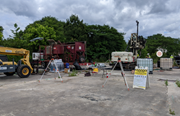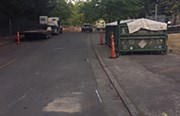How to Write Your RFQs to Get More Accurate Sonic Drilling Quotes
By: Cascade Environmental
Putting together a request for quote (RFQ) can be tedious, and it’s tempting to issue a generic one in order to get responses from drilling contractors faster. The problem is that this creates one of two issues—either you’ll get lots of questions as the contractors put together their proposal, or you won’t get questions, but you’ll receive proposals that are based on incomplete information and are high-risk for cost overruns. Although it’s more time consuming, the best approach is to include as much information as you can when building your RFQ. In this blog post, we’ll cover all the questions you’d ideally answer when putting out an RFQ for a sonic drilling project.
PROJECT LOCATION
I’m sure it comes as no surprise that your contractors need to know the location of your project site. Details of the location and potential limitations allow contractors to accurately estimate their timeline and costs:
- The street address—this allows us to look up the site on Google Maps so we can identify how difficult it may be to access the site.
- The site plan—if you have one showing well locations, please share it.
- Nature of the drilling locations—will they be on private property? In the right of way? And will the crew be drilling through pavement, a lawn, hard ground, or some other material?
- Hazards—are there any buried or overhead obstructions?
- Work space—is there room to park equipment and establish a staging area?
- Water availability—is there water on-site for various drilling processes?
Additionally, if any of the drilling locations are inside a building, provide a few more details, such as:
- If there is access at grade or through a loading dock
- The size of the garage doors
- Ceiling height
- Whether the space is vacant
SITE GEOLOGY
Sonic is a great technology for nearly any geology, but that doesn’t mean the geology doesn’t matter when building an estimate for a bid. Different formations may require more or less time to drill, and water use or grout take may vary. If you know the answers to these questions, be sure to share that information in the RFQ:
- Will the wells be completed in overburden or rock?
- What is the texture of the overburden? What is the estimated depth to rock?
- What is the bedrock type? Will it be massive or do you expect it to be fractured/cavernous?
CONSTRUCTION DETAILS
The devil may be in the details, but so are hidden costs. The more information provided ahead of time, the more accurate their quote will be. Consider including these construction details:
- Will drilling be vertical or at an angle to get under a structure?
- What type of boring will you need?
- Continuous core?
- SPT?
- Shelby tubes?
- diamond core?
- Borehole geophysics
- Are you building a well?
- If so, what is its purpose?
- What diameter do you need the well to be?
- What is the length of screen?
- Does it need to be milled slot or continuous?
- Will you be using PVC or stainless steel?
- Do you want a flush surface completion or protective steel casing?
- Are you doing groundwater sampling for a water quality profile as you drill?
- If so, what is the frequency?
INVESTIGATION DERIVED WASTE (IDW)
Although sonic technology produces less waste than many other drilling options, it is not waste-free and you must have a plan in place for managing it. Here’s what your drilling contractor needs to know about your IDW plans:
- Will solids and liquids be contained or released to to the ground?
- Are you using new or reconditioned 55-gallon drums?
- Will you be using bulk storage in roll-off boxes and frac tanks? And if so, are you providing them or do you need your drilling partner to do so?
- Is trash disposal available?
- Who is handling disposal?
TIMELINES
Your contractor obviously needs to know when the proposal is due back to you, but it’s also helpful to let them know when you anticipate making a decision on who you will be working with, and when the project will begin. You may find that this saves time evaluating proposals that ultimately can’t go forward, as your project conflicts with one the vendor may already have under contract.
When writing your RFQ, you may not have all the information available to include—and that’s okay. But as you compose your request, try to include as much as you can about project location, site geology, construction details, IDW plans, and project timelines in order to get the most accurate bids from potential contractors. Download a copy of our checklist to use as reference when building your next RFQ.
If you have a project in the works and want us to bid on it, let us know.












